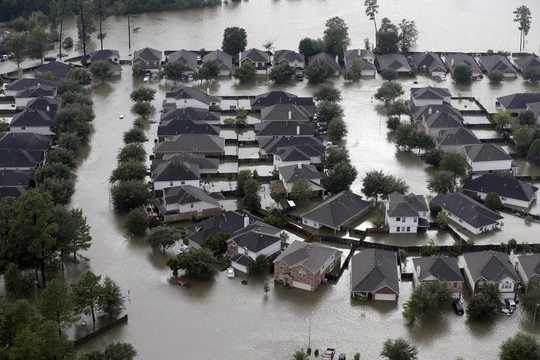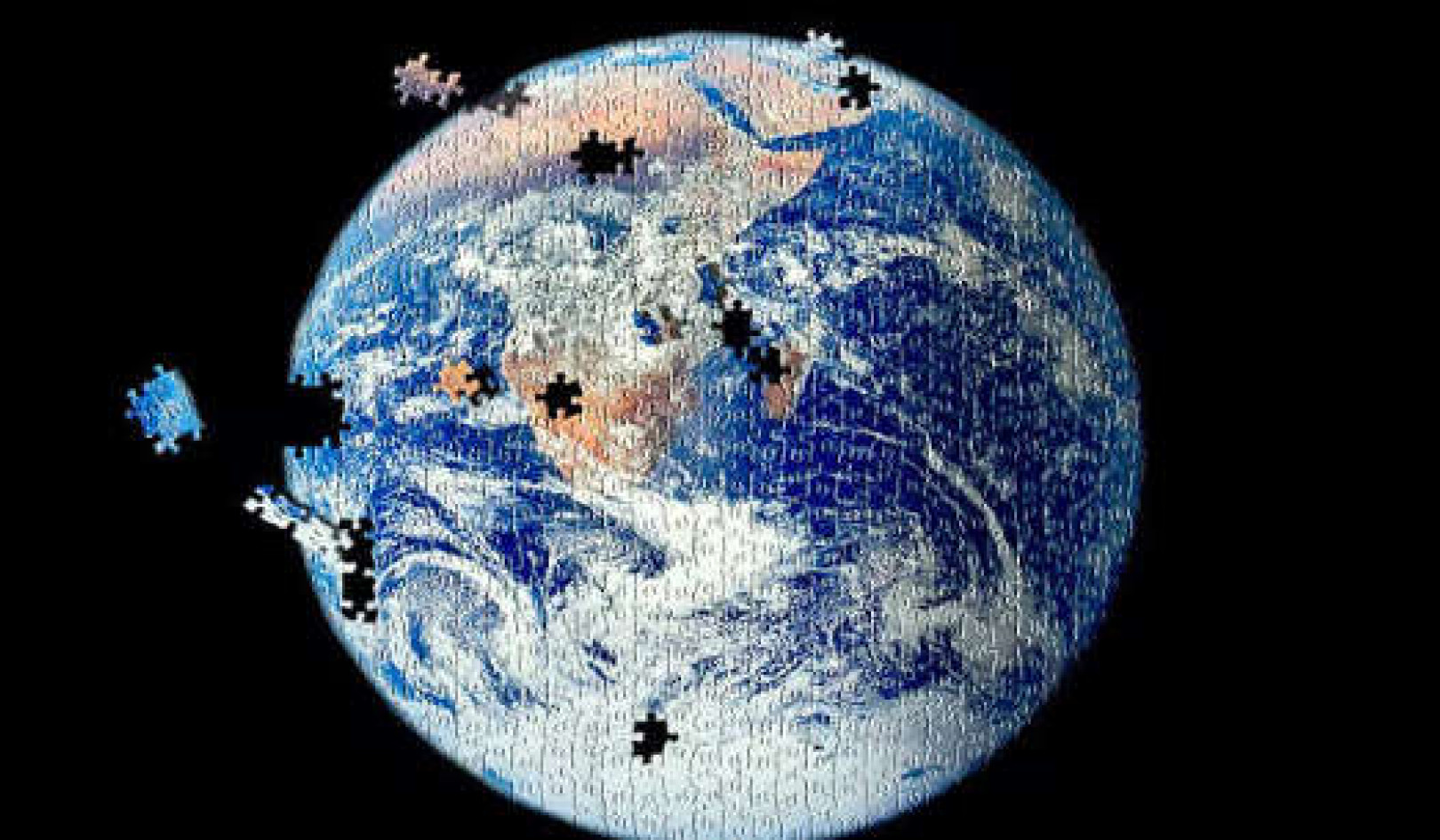
Homes are surrounded by floodwaters from Tropical Storm Harvey in Spring, Texas on Tuesday, Aug. 29, 2017. (AP Photo/David J. Phillip, File)
Imagine this: A young professional couple at a party mentions they’re thinking of buying a home in a popular waterfront neighbourhood that scientists have found is vulnerable to coastal flooding.
That flood risk is made extra clear by murals in the neighbourhood marking the predicted water level rise. What’s more, media headlines have warned about sea level rise daily during the past week.
So, what gives? Can the young couple just not see the evidence in front of them?
In recent years, we have been exposed to an abundance of information about climate change. This often takes the form of news articles about carbon emissions and the hurricanes, floods and forest fires bolstered by climate change.
Despite the strong evidence that human activities are contributing to climate change, a small minority of the public disagrees with the scientific consensus.
Do you see what I see?
In the face of the evidence, how can we explain this division?
As psychology researchers, we wondered whether some people are just blind to cues of climate risk.
When we’re confronted by visually crowded settings, we tend to notice emotional words and tune out others. For example, if you were presented a series of words appearing one after another in quick succession — 10 words per second — you would struggle to name all of them. But you would be more likely to catch a word like “danger” than a neutral one.
We set up exactly that kind of scenario in our study. We recruited university students, as well as people in shopping malls in the Vancouver area and in Kamloops, B.C. Then we showed each of them a rapid sequence of words and asked them to pick out two targets, such as a set of digits (555555555) and a word in green font, in the sequence.
Due to limits in our visual system, once the first target has appeared, people are unable to “see” the second target if it appears too soon after the first. This phenomenon is called the attentional blink. It’s as if the mind blinks after the first target, preventing you from seeing the second.
But things change when emotional words are used. Previous research has shown that if the second target is emotionally arousing, then people are better able to see it than if it is neutral — compare the words murder and keyboard, for example.

Smoke rises behind a levelled apartment complex as a wildfire burns in Ventura, Calif. in December 2017. (AP Photo/Noah Berger, File)
When we modified the test to measure people’s attention to climate change, we found people who are concerned about climate change are better at seeing climate-related words, such as carbon, right after the first target than those who are less concerned.
We also asked participants about their political orientation, income, education, religion, profession, experience with natural disasters and whether they owned a home near sea level.
When we analyzed the data, we found a pattern: Conservatives who were less concerned about climate change were less likely to see climate-related words than liberals who were worried about the issue.
In short, conservatives showed climate change blindness.
Targeted communication
Now that we know people’s political orientation affects their visual attention to climate change, this raises a possible feedback loop, where concerned liberals readily tune their attention to news headlines about climate change and become even more concerned.
But unconcerned conservatives may be more blind to the same headlines about climate change and therefore become more entrenched in their disbelief.
The visual blindness can further deepen the denial of the real risks of climate change such as flooding, hurricanes, drought and heatwaves, and consequently a lack of action to mitigate climate change.
If we’re to be successful communicating the risks of climate change to conservatives, we may need to go about it in a different way. Communications about climate change must tailor the climate-related information to the audience, especially those who are conservative or unconcerned.
We can do this by using messages that align with people’s political ideologies and personal values.
For example, we can frame climate change action as protecting our nation against climate catastrophes, advancing economic and technological development and creating a more caring and considerate society, which is an effective message to engage climate deniers. Framing environmentalism as a form of patriotism can be successful, particularly if the appeal is seen as coming from one’s in-group.
It’s always hard to get someone’s attention, but if the messaging is in line with their personal values and motivations, they will take notice.![]()
About The Authors
Jiaying Zhao, Assistant Professor, University of British Columbia; Jennifer Whitman, Postdoctoral Fellow, Northwestern University, and Rebecca M. Todd, Assistant Professor, University of British Columbia
This article is republished from The Conversation under a Creative Commons license. Read the original article.
Related Books
Climate Leviathan: A Political Theory of Our Planetary Future
by Joel Wainwright and Geoff Mann How climate change will affect our political theory—for better and worse. Despite the science and the summits, leading capitalist states have not achieved anything close to an adequate level of carbon mitigation. There is now simply no way to prevent the planet breaching the threshold of two degrees Celsius set by the Intergovernmental Panel on Climate Change. What are the likely political and economic outcomes of this? Where is the overheating world heading? Available On Amazon
How climate change will affect our political theory—for better and worse. Despite the science and the summits, leading capitalist states have not achieved anything close to an adequate level of carbon mitigation. There is now simply no way to prevent the planet breaching the threshold of two degrees Celsius set by the Intergovernmental Panel on Climate Change. What are the likely political and economic outcomes of this? Where is the overheating world heading? Available On Amazon
Upheaval: Turning Points for Nations in Crisis
by Jared Diamond Adding a psychological dimension to the in-depth history, geography, biology, and anthropology that mark all of Diamond's books, Upheaval reveals factors influencing how both whole nations and individual people can respond to big challenges. The result is a book epic in scope, but also his most personal book yet. Available On Amazon
Adding a psychological dimension to the in-depth history, geography, biology, and anthropology that mark all of Diamond's books, Upheaval reveals factors influencing how both whole nations and individual people can respond to big challenges. The result is a book epic in scope, but also his most personal book yet. Available On Amazon
Global Commons, Domestic Decisions: The Comparative Politics of Climate Change
by Kathryn Harrison et al Comparative case studies and analyses of the influence of domestic politics on countries' climate change policies and Kyoto ratification decisions. Climate change represents a “tragedy of the commons” on a global scale, requiring the cooperation of nations that do not necessarily put the Earth's well-being above their own national interests. And yet international efforts to address global warming have met with some success; the Kyoto Protocol, in which industrialized countries committed to reducing their collective emissions, took effect in 2005 (although without the participation of the United States). Available On Amazon
Comparative case studies and analyses of the influence of domestic politics on countries' climate change policies and Kyoto ratification decisions. Climate change represents a “tragedy of the commons” on a global scale, requiring the cooperation of nations that do not necessarily put the Earth's well-being above their own national interests. And yet international efforts to address global warming have met with some success; the Kyoto Protocol, in which industrialized countries committed to reducing their collective emissions, took effect in 2005 (although without the participation of the United States). Available On Amazon
From The Publisher:
Purchases on Amazon go to defray the cost of bringing you InnerSelf.comelf.com, MightyNatural.com, and ClimateImpactNews.com at no cost and without advertisers that track your browsing habits. Even if you click on a link but don't buy these selected products, anything else you buy in that same visit on Amazon pays us a small commission. There is no additional cost to you, so please contribute to the effort. You can also use this link to use to Amazon at any time so you can help support our efforts.






















